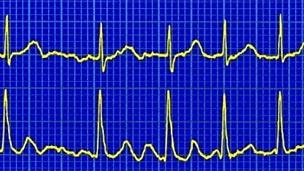Clot drug to help heart patients
- Published

A heart trace can reveal the problem
Hundreds of thousands of heart patients would benefit from new type of blood thinning drug to cut their risk of stroke, say UK experts.
Patients with atrial fibrillation (AF), an erratic and sometimes fast heartbeat, can reduce their risk by a fifth when taking rivaroxaban rather than the most popular existing treatment, warfarin.
The data comes from a study of 14,000 patients and was presented at the American Heart Association conference.
AF affects around 800,000 UK people.
One in five people over the age of 70 is likely to be diagnosed with an irregular heartbeat, which can lead to blood clots and cause strokes.
Disease prevention
Both rivaroxaban and warfarin work by thinning the blood to reduce the risk of clots.
Patients treated with warfarin are half as likely to have a stroke compared with those taking no treatment or aspirin.
However, the dosage needs to be closely monitored - in some cases once a week. Too high a dose can lead to internal bleeding, which can prove fatal, and too low a dose increases the risk of stroke.
Unlike warfarin, levels of the new drug do not need to be monitored as intently and the necessary dosage is not affected by certain foods or alcohol.
Rivaroxaban is already recommended on the NHS to prevent blood clots in people undergoing hip and knee replacement surgery.
Professor Keith Fox, British Heart Foundation professor of cardiology at the University of Edinburgh, who led the research, said: "Our study showed that rivaroxaban is simpler to administer and patients taking it have fewer strokes and blood clots.
"We now have an effective alternative to warfarin for patients with irregular heart beats and one that reduces complications and is easier to administer."
Professor Peter Weissberg, medical director at the British Heart Foundation, said: "This important study adds rivaroxaban to the increasing list of new drugs that seem to be at least as good as warfarin - the current standard therapy to prevent strokes in AF."
But he said: "The rate at which these new drugs are introduced into routine clinical practice will be determined by the extent to which regulators believe their benefits justify their additional cost."